Over the years of fixing stuff I have managed to gather a pretty good selection of tools and equipment that has allowed me to fix and repair almost anything that has come across my desk so I thought it was about time I did an article detailing out what I think it is essential tool set for a starting/intermediate electronics hobbyist.
Parts and components
You can’t start fixing and making things if you don’t have the right components. The basic list of things to keep on hard are a large selection of capacitors and resistors ( make sure you have the right voltage selection for the projects you need but 16v and 35v ratings are usually more than plenty for starter projects ). Diodes, heatshrink, switches, LED’s, voltage regulators, a large selection of transistors, Op Amps, I have lots of guitar effects unit parts as well like foot switches and 1/4″ jack sockets, potentiomenters ( both large and small ), trim pots, breadboards, jumper wire, screws and bolts and I would keep some arduino’s on hand as well for small projects.
Consumables
The stuff you are going to go through a lot are these things, I am constantly ordering more of this stuff. The list is: electrical tape, duct tape, 3M double sided tape, kapton tape, solder, solder wick, flux, thermal paste, thermal pads, hookup wire both solid core and stranded, lithium grease, compressed air, isopropyl alcohol in both 70% and 100%, cotton buds/q-tips, 1-up cards and super glue.
Hand tools
Doing electronics projects involves a lot of precision and you only get that with hand tools. I’ve never needed a power tool when working on electronics. I’d recommend you get: #2 philips screwdriver in a large handle ( my big green one ) this fits 75% of all screws, a similar size flathead, ruler, scissors, wire strippers, side cutters, pliers, tweezers, scraper, plastic pry tools, tool brushes and wire brushes for cleaning parts, box cutters/stanley blades, permanent markers, magnifying glass, brush for dusting parts off and a set of 1/4″ deep sockets with a hand driver as these are really useful for getting nuts off knobs and sockets.
To round out the hand tools, you can ever have enough precision screw drivers. I have a set of philips and flathead drivers, a set of torx drivers ( the black ones fit xbox and Playstation screws ), allen/hex head drivers and specialty Apply tri drivers and Nintendo/Sega star head drivers ( the orange and yellow ones ).
Test Equipment and soldering
The last category I would like to touch on is test equipment. These will vary in what you can afford and you will likely build up to this list, but I would say you would end up at a point similar to this. So to start: You are going to need a good multimeter, ideally an auto ranging one with a temperature probe as well, next on this list is a good soldering iron and solder sucker. I have a Yihua 8786D with an iron and air station built in as the hot air is good for SMD parts and reflowing or removing stubborn parts. Then I would say a good bench top power supply that can do 0-30v and 0-5/10amps with voltage and current limiting built in ( I actually have two of these now ) and some test leads with all the various plugs you could need for testing out different stuff (these sometimes come with the power supply).
A variac is also good for testing old equipment before putting full voltage through it or testing 110v equipment without getting a stepdown transformer. Keeping on going, a Logic probe/second multimeter ( in green ) breadboards with power supplies, transistor tester, dummy load block, mine is hand built next to the 1 Up card and allows me to put a load on power supplies to see if they work. A light bulb tester is great for testing faulty gear as if it has a short and draws to much current the bulb will glow first before blowing up the appliance.
Some optional but usual stuff to have would be the Oscilloscope, I went for a digital one, this is usual for measuring voltages, signals and fequencies and i’m still learning how to use it. On top of that a powerline meter is handy (next to the scope) as it tells you how much power is being drawn from the wall which is good for measuring PC wattage draw at load. A network line tester is handy for tracing wires and Ethernet lines in a house to find faults. I also have a couple of quick test units on the black boxes for testing guitar effects units quickly but these aren’t totally needed.


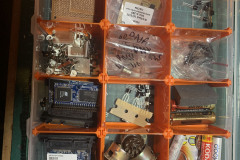
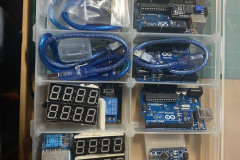
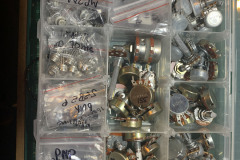
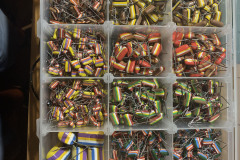
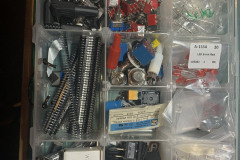
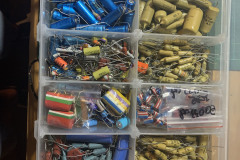
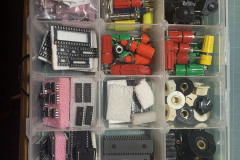
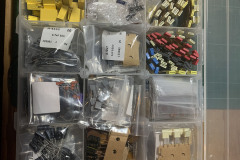
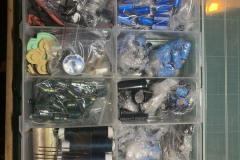
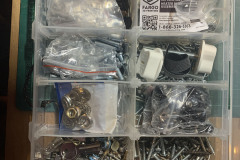
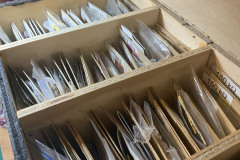
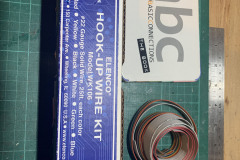
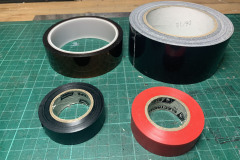
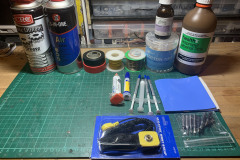
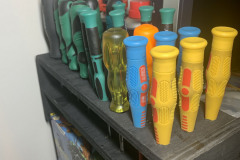
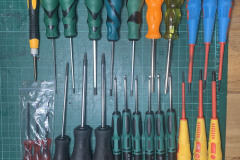
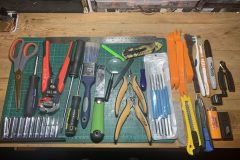
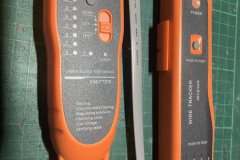
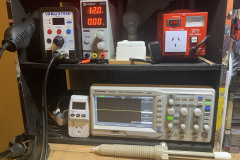
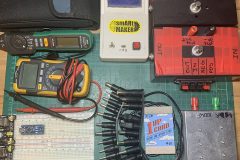
0 Comments